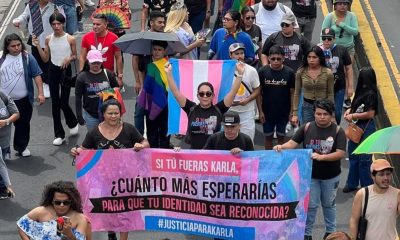World
US urges Central America governments to protect LGBTQ rights
Effort part of strategy to address migration ‘root causes’
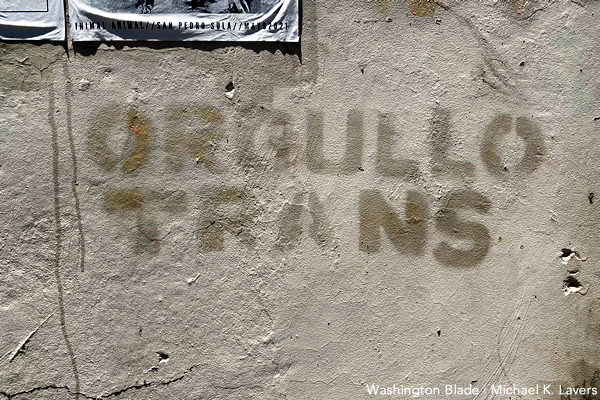
Editor’s note: International News Editor Michael K. Lavers was on assignment for the Washington Blade in El Salvador, Honduras and Mexico from July 11-25.
A State Department spokesperson says the U.S. will continue to urge the governments of Guatemala, El Salvador and Honduras to protect LGBTQ rights as part of its efforts to address the “root causes” of migration from the three countries.
“Human rights, including those of LGBTQI+ persons, is one of the central pillars of our engagement with leaders from Guatemala, Honduras and El Salvador,” said the spokesperson in response to a series of written questions from the Washington Blade.
“The United States raises concerns about violence, discrimination, abuse, harassment and stigma targeting LGBTQI+ (people) across northern Central America with various stakeholders,” added the spokesperson. “We work to engage on these issues across multilateral fora, such as the United Nations, the Equal Rights Coalition and the Organization of American States.”
Guatemala, El Salvador and Honduras form what is known as Central America’s Northern Triangle.
Vice President Kamala Harris, who met with Guatemalan President Alejandro Giammattei last month during her trip to Guatemala City, has said on numerous occasions that violence based on sexual orientation and gender identity is one of the factors behind migration from the region. Harris and other administration officials have also told migrants not to travel to the U.S.-Mexico border because it remains closed to them due to the pandemic.
LGBTQ Hondurans with whom the Blade recently spoke acknowledged violence has forced them to flee their homes.
Leonela Barralaga and Jerlín Martel are a same-sex couple who are raising an 11-year-old daughter in La Ceiba, Honduras.
They told the Blade on July 20 during an interview at the offices of Organización Pro Unión Ceibeña, a local human rights group, that they have fled Honduras twice. Barralaga and Martel said they returned to the country once because they did not want their daughter to further endure the squalid conditions in which they were living in Tapachula, Mexico, a city in the country’s Chiapas state that borders Guatemala.
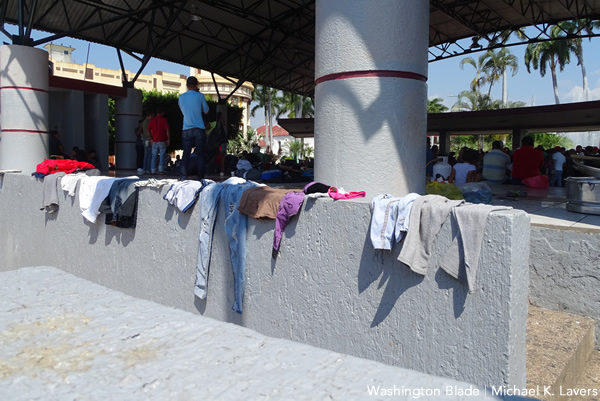
Marvin, a gay man from Honduras who plans to ask for asylum in the U.S., currently lives at Jardín de las Mariposas, a shelter for LGBTQ asylum seekers in the Mexican border city of Tijuana.
Marvin during a July 12 interview with the Blade at Jardín de las Mariposas spoke about his brother, who was murdered earlier this year in Honduras. Marvin was sobbing when Jaime Marín, who runs the shelter with his mother, Yolanda Rocha, showed this reporter a picture of his brother’s mutilated body in the morgue in San Pedro Sula, Honduras’ second-largest city.
A court in the Salvadoran capital of San Salvador last August sentenced three police officers to 20 years in prison for the 2017 murder of Camila Díaz Córdova, a trans woman who the U.S. deported. The Inter-American Court of Human Rights last month found Honduras responsible for the murder of Vicky Hernández, a trans woman who was killed hours after the 2009 coup that ousted then-President Manuel Zelaya.
Alexa, a trans woman who receives services at Organización Pro Unión Ceibeña, told the Blade during an emotional interview that she was raped in prison while serving a sentence for a stabbing she claims was an act of self-defense. Alexa also said guards forcibly cut her hair.
The Blade the day before witnessed a man stop his car on a street in San Pedro Sula, which is about three hours west of La Ceiba, and solicit for sex work two trans women with Colectivo Unidad Color Rosa, a local LGBTQ rights group. The U.S. granted asylum to Claudia Spellman, a trans woman who co-founded Colectivo Unidad Color Rosa, after death threats forced her to flee Honduras.
“The United States is committed to fighting for the human rights of LGBTQI+ persons at home and abroad,” the State Department spokesperson told the Blade. “LGBTQI+ persons are among the most vulnerable to forced displacement in and from El Salvador, Guatemala and Honduras.”
“Promoting and advancing these human rights is a foreign policy priority,” added the spokesperson. “As such, we endeavor to combat the violence and abuse, criminalization, discrimination and stigma targeting LGBTQI+ persons around the world, including in these three countries.”
Two members of Guatemalan civil society who work with LGBTQ people and people with HIV/AIDS — Visibles Executive Director Daniel Villatoro and Ingrid Gamboa of the Association of Garifuna Women Living with HIV/AIDS — are among those who participated in a round table with Harris in Guatemala City.
Samantha Power, administrator of the U.S. Agency for International Development, and U.S. Ambassador to Guatemala William Popp on June 17 visited the Guatemala City headquarters of Organización Trans Reina de las Noche, a trans advocacy group. The visit took place less than a week after Andrea González, the organization’s executive director who previously participated in the State Department’s International Visitors Leadership Program, was murdered near her Guatemala City home.
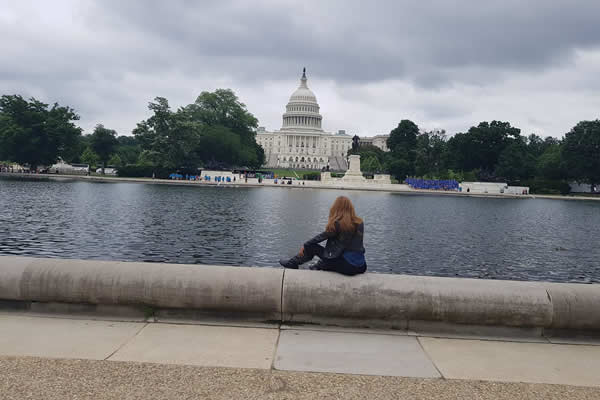
Sasha Rodríguez, a trans woman who works for Organización Pro Unión Ceibeña, is also an IVLP alum.
Bianka Rodríguez, executive director of COMCAVIS TRANS, a trans Salvadoran rights group, is among those who participated in what a USAID spokesperson described to the Blade as a “youth leaders lunch roundtable that we organized” with Power in San Salvador last month. The USAID spokesperson noted “they exchanged important points of view regarding USAID support (past and present) and the challenges of the LGBTIQ+ community in the country.”
“USAID human rights projects based in El Salvador support anti-discrimination efforts against the LGBTQI+ community,” said the State Department spokesperson. “They also support a regional effort that engages private sector companies in inclusive strategies to open labor opportunities for the LGBTQI+ community.”
“Projects also do research on hate crimes against the LGTBQI+ community and provides to the justice sector to investigate such crimes,” they added. “The majority of activities are led by local or regional LGBTQI+ groups.”
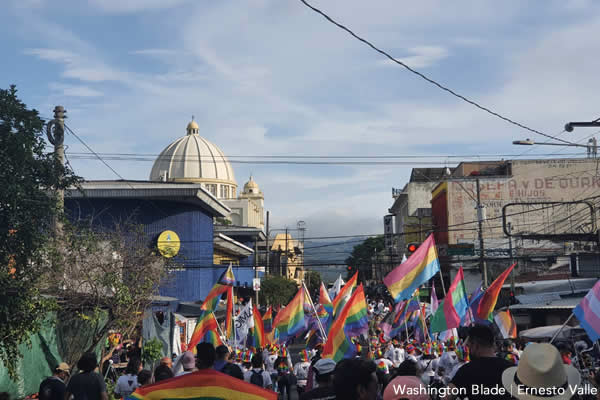
The State Department spokesperson noted “discussions between civil society leaders” and the U.S. Embassy in Honduras, “as well as USAID-led forums on LGBTQI+ migration push factors, help us learn more about the root causes and ways we can better support this community.” They also pointed out that USAID’s Unidos por la Justicia project “has supported the LGBTQI+ community to develop an anti-discrimination law and the law of gender identity” in the country.
USAID and Unidos por la Justicia in 2019 officially recognized Unidad Colectivo Color Rosa for its work. The Blade on July 19 saw a plaque with the two organizations’ logos on it hanging inside their San Pedro Sula office.
“USAID in Honduras has done extensive work with the LGBTQI+ population who lack access to formal education and workforce development services by supporting training that included self-esteem and human rights to prevent stigma and discrimination, and promote respect for diversity,” said the State Department spokesperson. “Through private sector engagement, businesses have agreed to interview members of the LGBTQI+ community, which is the foundation to valuing diversity in the workplace.”
USAID also works with Asociación PASMO, an organization that conducts HIV testing in San Pedro Sula.
The State Department spokesperson told the Blade that Honduran LGBTQ activists have attended workshops that focused on their participation in the country’s political process. They said USAID for the project’s next phase “will work with local higher education institutions to certify community members to participate as candidates in elections.”
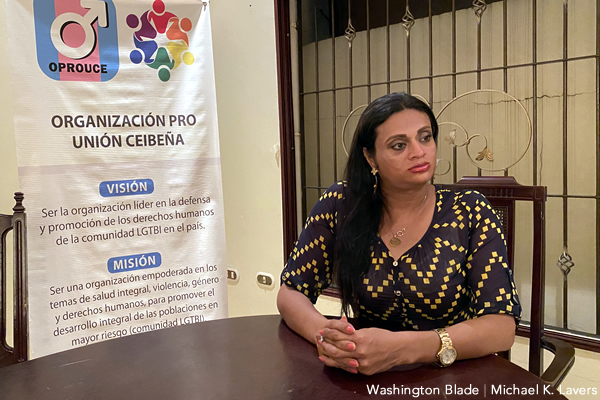
Honduras’ national elections are scheduled to take place on Nov. 28.
A federal judge in New York in March sentenced Honduran President Juan Orlando Hernández’s brother, former Honduran Congressman Juan Antonio “Tony” Hernández, to life in prison after a jury convicted him of trafficking tons of cocaine into the U.S.
The Biden administration on July 20 banned former Honduran President Porfirio “Pepe” Lobo Sosa, his wife and their children from traveling to the U.S. because of “their involvement in significant corruption.” Salvadoran prosecutors last week charged former President Salvador Sánchez Cerén and nine other members of former President Mauricio Funes’ administration with the misuse of more than $300 million in government funds.
Juan Francisco Sandoval, a leading anti-corruption prosecutor in Guatemala, fled to El Salvador on July 24 after Guatemalan Attorney General Consuelo Porras fired him. The Biden administration this week announced it has stopped working with Porras’ office.
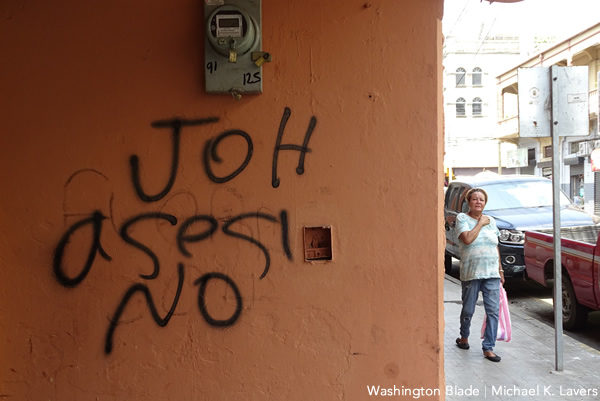
Corruption is one of the myriad issues that activists in the region have raised with the Blade. They also remain highly critical of their respective governments over the lack of LGBTQ rights.
“The United States is concerned with the protection governments extend to LGBTQI+ persons throughout the region,” said the State Department spokesperson. “While we have seen some positive developments; we will continue to raise the importance of protections for LGBTQI+ persons whenever appropriate, as well as the importance of holding accountable perpetrators of discrimination and violence.”
The State Department spokesperson also responded to the Blade’s question about what the Biden administration can do to ensure the Guatemalan, Honduran and Salvadoran governments adequately address anti-LGBTQ discrimination and violence in their respective countries.
“The U.S. government monitors and reports on the state of human rights across the world, including protections for the LGBTQI+ community,” said the State Department spokesperson. “Our efforts to draw attention to abuses of the human rights of LGBTQI+ persons create transparency and promote accountability for such abuses. The U.S. government also has sanctions and visa restriction authorities it can apply to perpetrators to promote accountability for human rights violations and abuses.”
Abdiel Echevarría-Caban and Dunia Orellana of Reportar sin Miedo contributed to this story.
Afghanistan
ICC issues arrest warrants for Taliban leaders over persecution of LGBTQ people, women
Groups ‘non-conforming’ with group’s gender policy targeted

The International Criminal Court on Tuesday issued arrest warrants for two top Taliban officials accused of targeting LGBTQ people, women, and others who defy the group’s strict gender norms.
The warrants are for Hibatullah Akhundzada, the Taliban’s supreme leader, and Afghanistan Chief Justice Abdul Hakim Haqqani.
“Based on evidence presented by the Office (of the Prosecutor), the judges found that there are reasonable grounds to believe that they have committed — by ordering, inducing, or soliciting — the crime against humanity of persecution, under article 7(1)(h) of the Rome Statute, on gender grounds, against girls, women, and other persons non-conforming with the Taliban’s policy on gender, gender identity or expression; and on political grounds against persons perceived as ‘allies of girls and women,’” reads an ICC press release that announced the warrants.
Karim Khan, the ICC’s chief prosecutor, in January announced a request for warrants against Taliban officials over their treatment of women and other groups since they regained control of Afghanistan in 2021. The request marked the first time the court specifically named LGBTQ people as victims in a gender persecution case before it.
“The issuance of the first arrest warrants in the situation in Afghanistan is an important vindication and acknowledgement of the rights of Afghan women and girls,” reads the press release the ICC released on Tuesday. “It also recognizes the rights and lived experiences of persons whom the Taliban perceived as not conforming with their ideological expectations of gender identity or expression, such as members of the LGBTQI+ community, and persons whom the Taliban perceived as allies of girls and women.”
A report that Outright International released in 2023 notes Taliban officials have systematically targeted LGBTQ people — especially gay men and transgender women.
Taliban officials have subjected them to physical and sexual assault as well as arbitrary detention. The Outright International report also notes Taliban authorities have carried out public floggings for alleged same-sex sexual relations, and have collected intelligence on LGBTQ activists and community members.
Artemis Akbary, executive director of the Afghanistan LGBTIQ Organization, praised the ICC.
“Today is a historic moment for LGBTIQ victims and survivors,” he said on social media.
El Salvador
#JusticiaParaKarla: una lucha por el derecho a la identidad en El Salvador
Karla Guevara inició su camino legal y personal en 2020
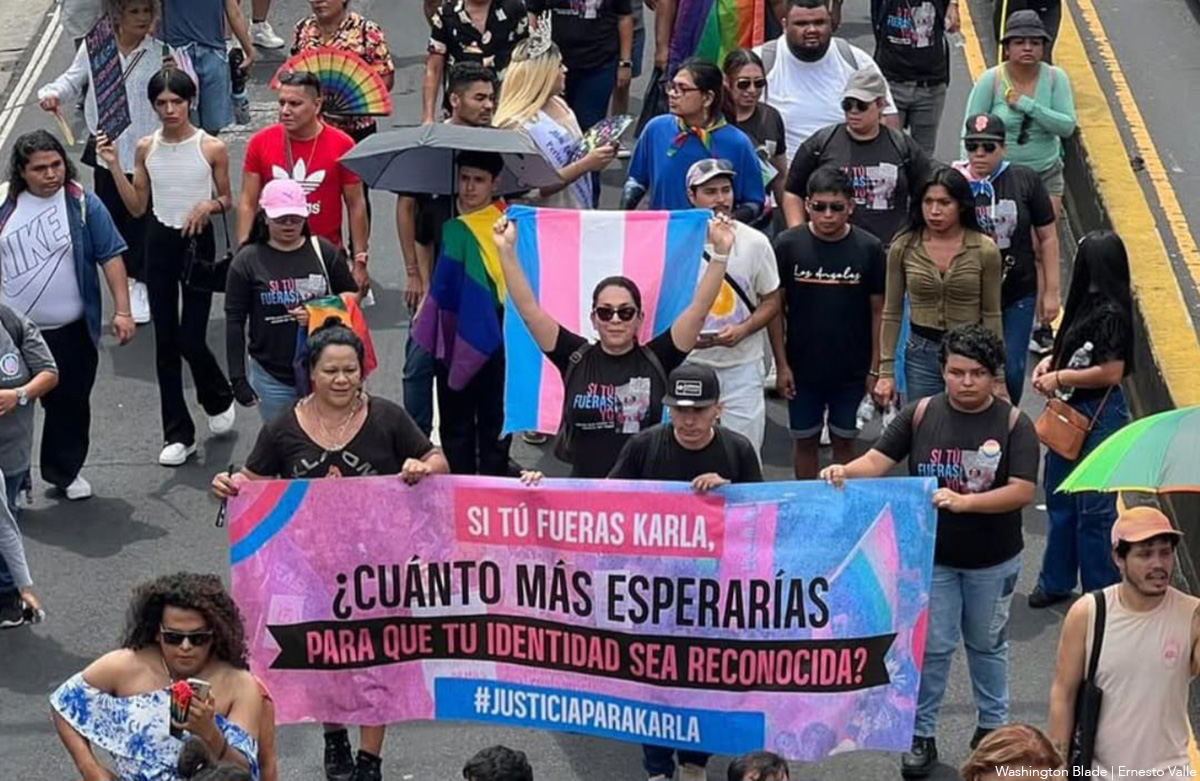
Cinco años han pasado desde que Karla Guevara inició un camino legal y personal para lograr que su nombre y género sean reconocidos en su Documento Único de Identidad (DUI). Cinco años de sentencias, apelaciones, puertas cerradas y vulneraciones que hoy se resumen en una sola palabra: resistencia.
En medio de un país que aún arrastra estructuras jurídicas y sociales poco sensibles a las realidades trans, Guevara se ha convertido en una voz visible. No solo por la denuncia pública de su caso, sino por su capacidad de transformar el dolor en acción: ha iniciado la campaña #JusticiaParaKarla, la cual acompaña con conversatorios llamados “Si tú fueras yo” en diferentes zonas del país.
Su historia se remonta al año 2018, cuando, junto a otras tres defensoras de derechos humanos —Mónica Hernández, Bianca Rodríguez y Verónica López— interpuso una demanda para lograr el cambio de nombre legal. La acción se inspiró en la Opinión Consultiva 24/17 de la Corte Interamericana de Derechos Humanos, que obligó a los Estados miembros de la OEA a garantizar los derechos de las personas trans, incluyendo el reconocimiento de su identidad.
A diferencia de sus compañeras, cuyo proceso fue resuelto favorablemente, Guevara fue la única a quien el Estado salvadoreño le negó el derecho, incluso tras contar con una sentencia favorable. El camino ha sido empinado, desgastante y doloroso, y ha implicado múltiples etapas legales con resoluciones contradictorias.
El 8 de enero de 2020, el juzgado declaró su demanda improponible. Guevara apeló el 22 de ese mismo mes, pero la Cámara de Familia desestimó su recurso. Aun así, perseveró. En abril de 2021 presentó una segunda apelación, y en septiembre se revocó la decisión del juzgado, ordenando admitir su demanda. Una pequeña luz parecía abrirse.
En agosto de 2022, después de varios peritajes que, según Guevara, incluyeron momentos donde se sintió expuesta y violentada, recibió una sentencia favorable: se autorizaba su cambio de nombre y género en la partida de nacimiento. Sin embargo, esta victoria fue parcial y breve. Aunque se ordenó marginar su partida, no se ordenó cancelarla como en otros casos similares.
El 4 de octubre de ese mismo año, la sentencia fue enviada al Registro del Estado Familiar. Pero la respuesta institucional fue sorprendente: el 3 de noviembre, la Alcaldía de San Salvador se negó a realizar el cambio. El jefe del registro y el registrador presentaron un amparo ante la Sala de lo Constitucional, paralizando el proceso.
“No solo me lo negaron, sino que ahora me exponen a un juicio aún mayor”, expresa Guevara. La frustración y la indignación fueron creciendo. En febrero de 2023, presentó una denuncia ante la Fiscalía General de la República, aunque lo hizo con poca esperanza. “Temía que no harían nada”, dijo. Y el 16 de abril de 2024, sus temores se confirmaron: la Fiscalía archivó el caso alegando que “no existe delito que perseguir”.
El 19 de noviembre de ese mismo año, Guevara decidió acudir a instancias internacionales y presentó su caso ante la Comisión Interamericana de Derechos Humanos. La CIDH ya notificó al Estado salvadoreño y le otorgó un plazo de cuatro meses para responder por qué no ha ejecutado el cambio ordenado por el juzgado.
“Obviamente no van a dar respuesta”, lamenta Guevara. Lo dice con la voz entrecortada, como quien ya ha llorado mucho, pero no ha perdido la voluntad de hablar. Reconoce que el proceso le ha afectado emocionalmente. “Cada vez que hablo de esto se me corta la voz”.
Las heridas no solo vienen de las oficinas estatales, sino también de las calles. Las miradas, los comentarios, el momento de presentar el DUI en cualquier trámite. “Es como si cada vez tuviera que explicar mi existencia. Es un juicio constante sobre quién soy”.
Guevara no está sola. Reconoce que hay otras personas trans en la misma situación. “Lo preocupante es que solo pasa en algunas zonas del país. En otras ha habido casos exitosos”, afirma. La disparidad en el trato revela una preocupante arbitrariedad institucional.
Uno de esos casos exitosos es el de Valeria Mejía, coordinadora de monitoreo y evaluación de ASPIDH. Su DUI ya refleja su nombre identitario, aunque no su género.
“Cuando recibí mi DUI con el nombre que me identifico pensé: aquí empieza una nueva vida”, relata.
Para Mejía, el cambio fue profundamente simbólico. “Uno ve pasar toda su vida frente a los ojos. Toda la discriminación, todos los rechazos. Sentí que algo sanaba”. A pesar de ello, su género asignado al nacer sigue apareciendo en el documento, lo que le genera inseguridad.
“El problema es que tengo que ir a todas las instituciones donde aparezco con mi nombre anterior. En el Seguro Social, por ejemplo, aún estoy registrada con el nombre masculino y no pueden atenderme, aunque el número del DUI sea el mismo”, explica.
Casos como los de Guevara y Mejía visibilizan una problemática estructural: el Estado salvadoreño no garantiza de forma uniforme el derecho a la identidad de las personas trans. Las resoluciones favorables son solo el primer paso. Su implementación efectiva aún tropieza con prejuicios, burocracia y omisiones.
Con la campaña #JusticiaParaKarla, la activista busca más que una solución a su caso personal. Busca generar conciencia, exigir coherencia legal y empujar una transformación cultural. En la marcha del 17 de mayo contra la LGBTIfobia, su presencia se hizo notar con camisetas, banners y mensajes que interpelan directamente al sistema.
Guevara ha hecho de su cuerpo, su voz y su historia una herramienta de resistencia. En cada conversatorio de “Si tú fueras yo”, invita a imaginar, a empatizar, a incomodarse.
“Lo que me pasa a mí le puede pasar a cualquier persona trans. Y si el Estado no nos reconoce, nos niega también la posibilidad de existir plenamente”, expresa.
Hoy, la resolución está en manos de la CIDH y el tiempo corre. La lucha de Guevara ya no es solo por una partida de nacimiento. Es por el derecho a ser, a vivir sin miedo, a que el nombre que la representa no siga siendo un motivo de juicio, burla o rechazo.
Mientras tanto, sigue esperando. Sigue alzando la voz. Sigue sembrando esperanza en quienes vienen detrás. Porque como ella misma dice: “Esto no se trata solo de mí. Se trata de justicia”.
China
Female writers arrested in Chinese crackdown on gay erotic fiction
Pingping Anan Yongfu arrested last month, detailed ordeal on Weibo

On China’s Weibo, a platform akin to a digital town square, a young woman using the handle Pingping Anan Yongfu laid bare a harrowing ordeal. She was arrested and subjected to a humiliating strip search for publishing gay erotic fiction. Her raw and unsparing account exposed a broader clampdown.
Since February, at least 30 other writers — mostly women in their 20s — have shared similar stories of law enforcement raids, their lives upended for crafting “danmei,” a genre of male-male romance often laced with explicit themes, on Haitang Literature City and other platforms.
”I will never forget it — being escorted to the car in full view,” posted Pingping. “Enduring the humiliation of stripping naked for examination in front of strangers, putting on a vest for photos, sitting in the chair, shaking with fear, my heart pounding.”
A wave of legal limbo engulfs the writers, with many released on bail or awaiting trial, their fates uncertain, according to a BBC. Others remain behind bars, their detention a stark reminder of the crackdown’s reach.
Beyond those arrested, a broader net has been cast: scores of contributors to Haitang Literature City have been hauled in for interrogations, their online words now a potential liability under China’s pornography laws for producing and distributing obscene materials.
China’s pornography laws cast a long shadow over writers, with those profiting from their work facing prison terms exceeding a decade for crafting “explicit descriptions of gay sex or other sexual perversions.” Yet, heterosexual erotica often escapes such scrutiny, slipping through the cracks of enforcement. Nobel Laureate Mo Yan, whose novels brim with graphic sexual scenes, and Jia Pingwa, known for vivid depictions in works like “Abandoned Capital,” and other acclaimed writers continue to publish freely, their books lining shelves without fear of raids. This stark disparity underscores a selective crackdown, where gay erotica bears the brunt of official censure.
Beijing’s unease with the online outcry was palpable, as the trending hashtag #HaitangAuthorsArrested, which amassed more than 30 million views on Weibo, vanished abruptly under censorship’s heavy hand. Posts offering legal advice to the embattled writers were scrubbed, and a detailed report on the crackdown by Caixin, a leading Chinese news outlet, was swiftly taken offline. Writers’ accounts, including some of their pseudonymous handles, have also begun to disappear, erased from the digital landscape as authorities tighten their grip.
As her post ricocheted across China’s digital sphere, Pingping abruptly deleted it, replacing it with a brief message expressing gratitude to supporters while conceding she had broken the law. The admission, tinged with resignation, marked her final act on Weibo before she erased her account entirely, vanishing from the platform amid mounting pressure from authorities.
“Danmei,” a vibrant subgenre of Chinese fiction, centers on romantic and often sexually explicit relationships between men, captivating a largely female readership through its blend of emotional depth, fantasy, and forbidden desire. Rooted in Japanese “yaoi” or “boys’ love,” but distinctly shaped by Chinese cultural sensibilities, it flourishes on Haitang Literature City and JJWXC and other platforms where writers craft sprawling tales of historical, fantastical, or modern love that often laced with themes of power and sacrifice.
Despite its popularity — bolstered by blockbuster adaptations like “The Untamed,” which amassed millions of fans — “danmei” faces intense scrutiny in China, where authorities deem its explicit content “obscene” under vague pornography laws. This tension reflects a broader cultural clash: while “danmei” offers a space for exploring queer identities and challenging traditional gender norms, its underground allure draws both devoted fans and the wary eye of censors seeking to uphold conservative values.
A sweeping crackdown in late 2024 saw Chinese authorities prosecute roughly 50 “danmei” writers, ensnaring them in a legal dragnet under the country’s 2004 obscenity laws. Among them, Yuan Shang Bai Yun Jian, a prominent author who earned 1.85 million yuan ($250,874.58) from her work on Haitang Literature City, was sentenced to nearly five years in prison, her success weaponized as evidence of “obscene materials for profit.”
The harsh penalties, which outstrip those for some violent crimes, sparked outrage online, with netizens decrying the disproportionate punishment for crafting stories that, while explicit, harmed no one.
Chinese media regulator banned ‘danmei’ TV dramas in 2022
Humiliation washed over Pingping as law enforcement stormed into her college classroom, recounted a writer using the Weibo handle “Tianxia Ju Da Bingyuan” or “The World Is a Vast Asylum.” Dragged from her lecture under the stunned gazes of her peers, she endured a public spectacle as officers trailed her to her dormitory, rifling through her belongings in a search for evidence of her “danmei” stories, leaving her exposed and her privacy shattered.
“Danmei” novels, centered on male-male romance have spurred numerous Chinese television dramas, but state censorship has sharply reduced their output. A 2021 Sixth Tone report identified more than 60 “danmei”-based dramas in development or slated for release, involving actors who include Chen Feiyu and Fan Chengcheng. Many of them, however, were halted following the 2022 National Radio and Television Administration ban on such adaptations.
MyDramaList records 16 aired series, including “The Untamed” (2019) and “Word of Honor” (2021), each with 30–50 actors, totaling approximately 480–800 performers. Lead actors, including Xiao Zhan and Wang Yibo, earned $1–3 million per series, per The China Project, while others made $50,000–$100,000, though precise figures remain limited due to private contracts. The 2021 “Internet Clean-up Campaign” and continued restrictions have significantly curbed new “danmei” adaptations.

